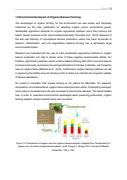Page |5 1.5 Environmental Impact of Organic Banana Farming: The advantages of organic farming for the environment are well known and frequently mentioned as the main justification for selecting organic versus conventional goods. Sustainable agriculture depends on organic agricultural practices since they improve soil health, lessen chemical runoff, and increase biodiversity (Tuomisto et al., 2012). Because of the size and intensity of conventional banana production—which has been connected to pollution, deforestation, and soil degradation—banana farming has a particularly large environmental impact. Research has indicated that the use of more sustainable agricultural methods in organic banana production can help to lessen some of these negative environmental effects. For instance, agroforestry methods, which combine banana farming with other crops and trees to increase biodiversity and lessen the ecological footprint of banana production, are frequently used on organic farms (Méndez et al., 2010). Furthermore, organic farming methods can aid in enhancing the fertility and soil structure, both of which are critical to the long-term viability of banana plantations. It's crucial to remember that organic farming is not without its difficulties. For example, compared to conventional farms, organic farms could yield less, which, if improperly managed, could result in increased land use and increased environmental damage. This demonstrates how, in order to maximise environmental advantages while preserving productivity, organic farming systems require continual study and innovation. Figure 1.5 Comparison of organic and non-organic banana samples. Adapted from 'Sustainability of organic and conventional agricultural systems,' by M. Kang & J. Zhang, 2015, Journal of Cleaner Production, 100, p. 325.
